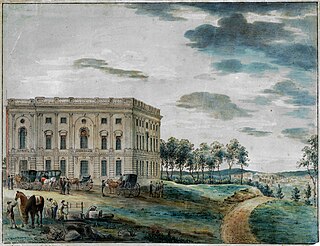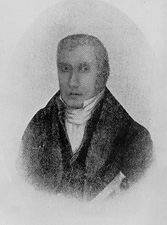Related Research Articles

The 10th United States Congress was a meeting of the legislative branch of the United States federal government, consisting of the Senate and the House of Representatives. It met in Washington, D.C., from March 4, 1807, to March 4, 1809, during the seventh and eighth years of Thomas Jefferson's presidency. The apportionment of seats in the House of Representatives was based on the 1800 census; both chambers had an overwhelming Democratic-Republican majority.

The 11th United States Congress was a meeting of the legislative branch of the United States federal government, consisting of the United States Senate and the United States House of Representatives. It met in Washington, D.C. from March 4, 1809, to March 4, 1811, during the first two years of James Madison's presidency. The apportionment of seats in the House of Representatives was based on the 1800 United States census. Both chambers had a Democratic-Republican majority.

The 1808–09 United States House of Representatives elections were held on various dates in various states between April 26, 1808, and May 5, 1809. Each state set its own date for its elections to the House of Representatives before the first session of the 11th United States Congress convened on May 22, 1809. They coincided with James Madison being elected as president. Elections were held for all 142 seats, representing 17 states.

The 1806–07 United States House of Representatives elections were held on various dates in various states between April 29, 1806 and August 4, 1807. Each state set its own date for its elections to the House of Representatives before the first session of the 10th United States Congress convened on October 26, 1807. They occurred during Thomas Jefferson's second term. Elections were held for all 142 seats, representing 17 states.

James Fisk was an American politician from Vermont. He served in the House of Representatives and the United States Senate.
William Chamberlain was an American politician from Vermont. He served as a United States representative and as the fourth lieutenant governor of Vermont.
William Baylies was an American lawyer and politician who served four non-consecutive terms as a U.S. Representative from Massachusetts in the early to mid-19th century.

The 1808–09 United States Senate elections were held on various dates in various states, coinciding with the 1808 presidential election. As these U.S. Senate elections were prior to the ratification of the Seventeenth Amendment in 1913, senators were chosen by state legislatures. Senators were elected over a wide range of time throughout 1808 and 1809, and a seat may have been filled months late or remained vacant due to legislative deadlock. In these elections, terms were up for the senators in Class 1.

The 1808 United States House of Representatives elections in New York were held from April 26 to 28, 1808, to elect 17 U.S. Representatives to represent the State of New York in the United States House of Representatives of the 11th United States Congress. At the same time, a vacancy was filled in the 10th United States Congress.

Following the September 1808 election for delegates to represent Vermont in the 11th United States Congress, two of its four districts had failed to choose representatives. A second ballot was held in December, giving Vermont a total of three Federalist representatives and one Democratic-Republican.

In September 1808, the Federalist ticket won a majority in Rhode Island's election for delegates to the United States Congress, with nearly 500 votes.

The 1808 United States Senate election in Pennsylvania was held on December 13, 1808. Michael Leib was elected by the Pennsylvania General Assembly to the United States Senate.
References
- 1 2 "10th Congress March 4, 1807, to March 3, 1809". Office of the Historian, United States House of Representatives. Archived from the original on September 21, 2018. Retrieved September 24, 2018.
- ↑ Election returns from Ourcampaigns.com